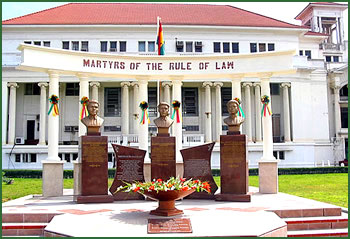The Supreme Court has given the go ahead to a United State based Ghanaian lawyer Professor Stephen Kweku Asare to amend a writ he had filed against the General Legal Council (GLC).
In October 2015, Prof. Asare, the plaintiff proceeded to the highest court of the land over the legality of the modes of admission used by the Ghana School of Law to admit LLB holders into the Professional Law course by the School.
He contended that the number of people who are admitted into Ghana School of Law was woefully small considering the number of people who possessed LLB.
At today sitting’s Ms Ofosua Amagyei, counsel for the plaintiff drew the attention of the seven member panel presided over by Mr Justice Jones Dotse that she had filed application for leave to amend their writ.
According to her the amendment was minor and it was to put the year 2015 issues in context because the Ghana School of Law had completed with their admission that year and had gone ahead with that of 2016.
Mr Kizito Beyuo who represented the GLC and Mrs Dorothy Afriyie Ansah, Chef State Attorney who represented the Attorney General did not oppose to the amendment.
The court therefore gave the plaintiff’s lawyer two days to file the amendment whilst the defendants in the matter were given seven days to respond if any.
It therefore adjourned the matter to May 2 stating that it would be taking the memorandum of issues by the parties in court on the said date.
Prof Asare had gone to the Supreme Court to seek a declaration that that GLC’s imposition of entrance examination and interview requirements for the Professional Law Course violates Articles 11 (7) 297 (d) 23, 296 (a) (b) and 18 (2) of the 1992 Constitution.
He is seeking a declaration that that the GLC’s exclusion of persons who have qualified under Regulation 2 of LI 1296 from pursuing the Professional law course violates Article 11 (7) 297 (d), 23, and 296 (a) and (b) of the Constitution.
The Plaintiff is also praying the court for an order directed at the GLC to specify within 60 days; alternative places and modes of instructions that would afford all persons meeting the requirement of Regulation 2 of LI 1296 an opportunity to pursue the profession component of legal education, the completion of which entitles them to take the qualifying certificate examinations as determined by the GLC.
Â





